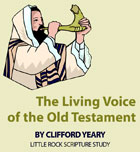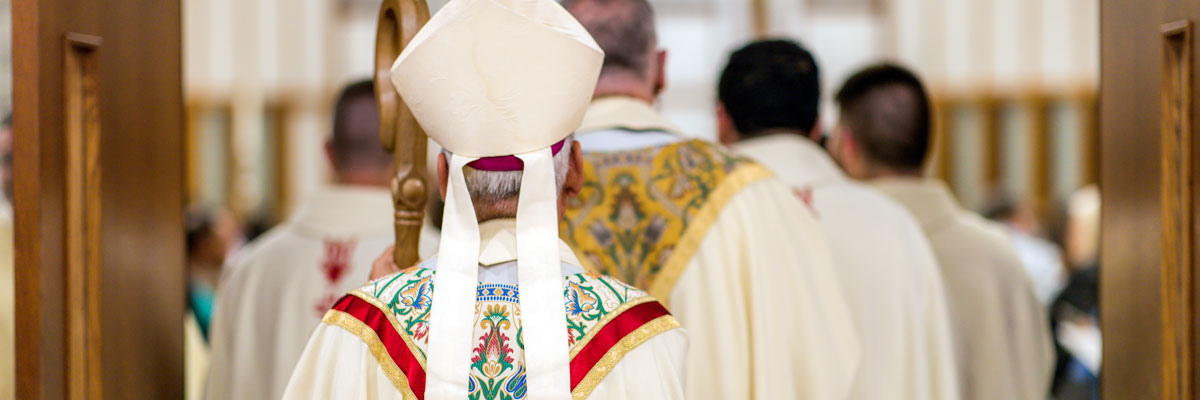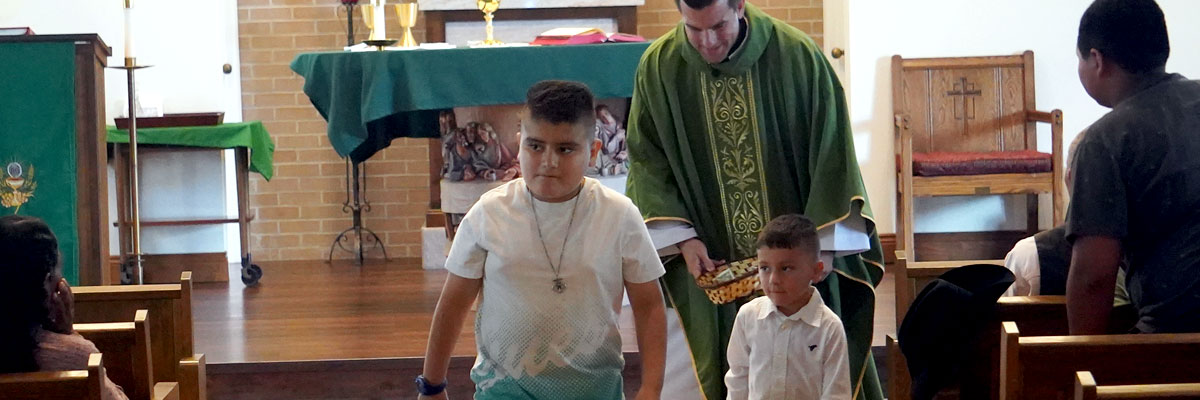Official Website of the
Catholic Diocese of Little Rock
Listen to Old Testament with two ears
Published: August 29, 2009
This is the first column in a six-part series
By Clifford M. Yeary
Associate Director, Little Rock Scripture Study
When no gospel had yet been written, before Paul had penned his first letter (First Thessalonians), Christians had a Bible, and the earliest Christian teachers steeped themselves in it because of its rich treasures. Their task was to explore this first Bible and convey from it a message bursting with faith in the risen Messiah. Today, the Christians’ first Bible is commonly called the Old Testament, and while its value for Christian faith remains as rich as ever, many Christians, Catholic and Protestant alike, find recognizing its wealth a sometimes bewildering task.
 Looking for the treasure of the Old Testament is a task connected to what Jesus called the duty of the scribe in Matthew 13:52. “Every scribe who has been instructed in the kingdom of heaven is like the head of a household who brings from his storeroom both the new and the old.” Both old and new are of immense value. We might summarize the new and the old in this way, but without exhausting the many possibilities: The old is the truth of God’s call and covenant with the Jewish people. The new is the Good News that the Messiah brings to all peoples of the earth.
Looking for the treasure of the Old Testament is a task connected to what Jesus called the duty of the scribe in Matthew 13:52. “Every scribe who has been instructed in the kingdom of heaven is like the head of a household who brings from his storeroom both the new and the old.” Both old and new are of immense value. We might summarize the new and the old in this way, but without exhausting the many possibilities: The old is the truth of God’s call and covenant with the Jewish people. The new is the Good News that the Messiah brings to all peoples of the earth.
For Christians, the Old Testament speaks most loudly and clearly as the foundation for the New Testament. But as we just saw in Matthew, Jesus expects us to find and value the old, even as we seek the new. The Old Testament speaks boldly and inspiringly of God’s covenant with the Jewish people even as it proclaims to Christians the promise of an ultimate messenger of God’s love, whose death and resurrection would ratify a covenant between God and all peoples of the earth.
We should listen to the divinely inspired words of the Old Testament with two ears, then, one attuned to God’s message to the first covenant people and another to discover in that same message the mystery of God’s promise fulfilled in Jesus. It is the story of an ancient people’s encounter with the One who creates and sustains the entire universe. We know that universe to be immensely larger, older and more complex than they did, but the One who created the universe still breathes life through the words of their story. The crux of this encounter is the covenant that binds God and people together.
This is a people called to belong to God in a special way, distinct from all other peoples of the world because they are called to bear witness to God’s love and goodness to all other peoples of the world. The Gospels stand at the head of the New Testament in part because it is in them that we most clearly hear Christ’s call to “come, follow me.” Likewise, the Pentateuch (Genesis, Exodus, Leviticus, Numbers and Deuteronomy) stands at the head of the Old Testament because it is there that God, through Moses, calls Jews of all time to be his people and shows them the way to life, blessing and peace.
Just as the Gospels ask us to make a commitment to follow Christ, the Pentateuch lays before the ancient people of God the challenge to accept their call as a people and so to enter into the inheritance promised Abraham, Isaac and Jacob. The Pentateuch culminates in the Book of Deuteronomy. In it, all the people of Israel are described as standing in formation on the far side of the Jordan awaiting the command to enter the Promised Land.
But in Deuteronomy, they never actually enter their inheritance. That does not happen until the Book of Joshua, and yet, in Jewish faith and practice, the Pentateuch commands more attention than Joshua. Why is that? Catholic Old Testament scholar Father Lawrence Boadt, CSP, tells us that it is because the Pentateuch has been very carefully crafted to speak to the religious needs of Jews of all time, whether living in the Holy Land or not.
Wherever they live, in whatever time, God calls them to embrace the covenant that makes them God’s people. The call to enter the land of promise is not just about real estate, but about accepting all that comes with being chosen by God. It is a call to enter the world as responsible witnesses to the Creator God’s demand for justice and holiness in every aspect of life. Christians hear a similar call in Deuteronomy. Like Jews of the Diaspora, who are called to live in faithfulness outside the borders of the Promised Land, Deuteronomy calls Christians to be holy and just while awaiting the kingdom for which Jesus taught us to pray.
Study Questions
1. What all-important message did early Christian teachers look to find in the Old Testament?
2. How is the Old Testament said to contain both an old and a new message to Christians?
3. What are some stories or accounts from the Old Testament that you like to remember?
4. How might reading the Old Testament with “two ears” help Christians grow in their own faith while at the same time grow in appreciation of its meaning for Jews?
This article was originally published in Arkansas Catholic Aug. 29, 2009. Copyright Diocese of Little Rock. All rights reserved. This article may be copied or redistributed with acknowledgement and permission of the publisher.









